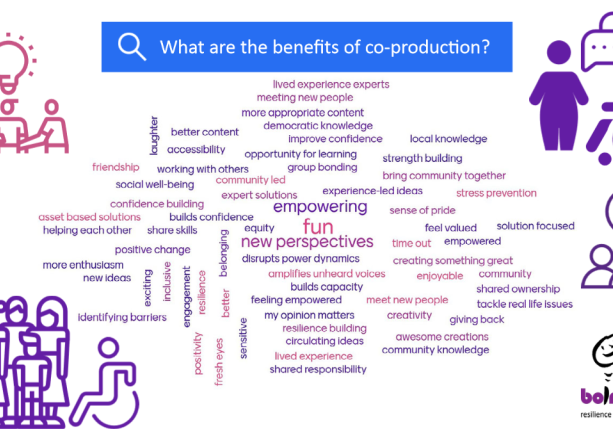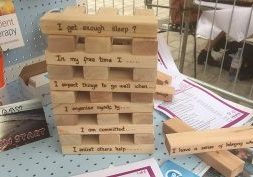Our Co-productive Thoughts
National Co-production Week 2022 took place from 4 to 9 July. Back for a seventh year, it marks a celebration of the benefits of co-production, highlighting good practices and promoting the contribution of people who use services and carers in developing better public services.
This year’s theme has been the impact of co-production, something that Boingboing can highlight in abundance, and has been doing so this past week across its various social media platforms, including Twitter and Facebook.
Awareness days, weeks and months do an admirable job at raising awareness of the most important and prevalent of causes. The various hashtags and events are often picked up by companies keen to show they share the same values of the causes in the spotlight.
It can be a comedown, however, when the ‘awareness’ ends and we simply move onto the next. Co-production, much like resilience, is in the DNA of Boingboing and those part of it. While we champion a week where awareness is raised and the importance of co-production is better understood, and appreciated, we are also proud to say that our co-productive beliefs and practices are in existence every day, every year.
What does co-production mean to Boingboing employees? How has it effected their working practice? Let them tell you:
“Co-production can be challenging in moments. It can take more time, planning and consideration to ensure you are getting people’s opinions and once you have got those thoughts making a final decision can sometimes be hard whilst trying to honour people’s contributions.
“The phrase ‘Too Many Cooks’ can sometimes come to mind. However, being able to rely on others and support each other through decisions, brainstorming and ideas is a great thing too.” Lauren, Engagement Worker.
“The first time I took part in co-production was during lockdown, when we produced ReMit. I had quit my previous job and started to feel lonely and had thoughts that I weren’t good enough. By being part of the coproduction team, I felt less isolated because I knew I was amongst people who understood me and could go to for a chat.
“Even though I was also volunteering at the time, I didn’t feel as if I was a volunteer because we were all treated equally.” Grace, Engagement Worker.
“Personally, co-production has really opened up my perspective to tackling problems collaboratively – that nothing needs to be done solely and as a matter of fact the results are better than taking a one (or a few) person approach.
“About perspective, co-pro takes all perspectives into account, because one just isn’t enough in being able to see the bigger picture. Through this, it allows all involved to be and feel heard, valued and to let of the steam that builds in frustration from not being heard in the first place.” Ben, Administration Apprentice.
“Co-production is coming together with others to create something together. No one voice is more important than another.
“Co-production is empowering and builds confidence! Feeling at part of something gives you more ownership of a project which can lead to better investment in promoting or working alongside what has been created.” Nichola, Engagement Worker.
We look forward to next year’s Co-production week and wonder what theme 2023 will bring. I’m sure we will be ready for it, having spent the last 12 months working co-productively.

